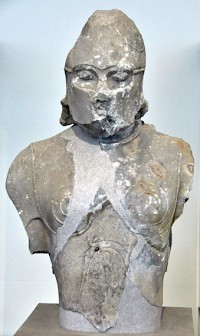Syloson
Syloson (Greek: Συλοσών): tyrant of Samos (since 517 BCE), brother of Polycrates.

We know about Syloson of Samos mosly from one source only: the Histories by the Greek researcher Herodotus of Halicarnassus, who lived about one century after Syloson but appears to have known Samos quite well. He tells us that Syloson was a son of a man named Aiaces and a brother of Polycrates,note the powerful tyrant of Samos who had been an ally of king Amasis of Egypt.note His brother had send him into exile, note and Syloson resided at the court of the Achaemenid king of Persia, Cambyses II.
When the Persians invaded Egypt, Syloson was present and was acquainted with the king’s relative Darius.note According to story told by Herodotus, on one occasion, Syloson gave his mantle to Darius, a gift that the Persian prince gladly accepted.
Shortly after the conquest of Egypt, Cambyses diednote and there was a period of great unrest in the Persian Empire, which is documented in the Behistun Inscription. In the end, Darius would become king and restore order. In this confused period, the satrap of Lydia, a man named Oroetus, invited Polycrates to the Asian mainland, where he had him killed.note Later, the satrap of Lydia was in turn killed by Bagaeus, who had been sent by Darius.note
At this moment, Syloson came to Darius’ palace in Susa and told the guards that he was a benefactor of the king. Being allowed to visit the king, he renewed the friendship, and his former comrade-in-arms asked him if there was a gift he wanted, to which Syloson replied that he wanted to succeed his dead brother.note It is likely that Darius was looking for a new governor of Samos anyhow. The island was reoccupied by a Persian army, commanded by Otanes, who installed Syloson as ruler.note This was the end of the last independent state in Asia Minor. Herodotus tells:
As for Samos, the Persians took the entire population like fish in a drag-net, and presented Syloson with an empty island.note
It comes as no surprise that Syloson's rule was considered cruel. Centuries later, the geographer Strabo of Amasia recorded a proverb that "by the will of Syloson there is plenty of room", referring to the depopulated city.note
Syloson was the father of Aiaces,note who appears to have succeeded Syloson quite soon after his accession, because we found Aiaces in Persian service in c.513.note In 499, he was deposed by supporters of the Ionian Revolt,note but when the Persians repressed this insurrection in 494, they brought back Aiaces to his island. An island that was again quite empty, because the population had decided to migrate to Sicily.note